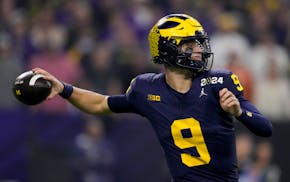Remember the good ol' days of Twins baseball? Remember back in ought-10, when Minnesota's most likeable franchise opened Target Field, the Happiest Place on the Prairie, and frolicked through a near-perfect summer of glowing sunshine and inspirational play?
That celebratory season seems long ago and far away as a childhood beach vacation. In 2011, the Twins are endangering everything they've built, from their huge season-ticket base to their long-held reputation as a resilient and hyper-competitive team.
Sun-warmed sellout crowds cheering for a division champion have yielded to smatterings of damp and angry fans wondering why their model franchise can't throw strikes or run the bases. Sunday, in their 11-3 loss to Toronto at Target Field, they fell to a baseball-worst 12-26, continued to perform at a historically inept pace at the plate, and offered the sad spectacle of left fielder Delmon Young refusing to chase after a baseball while pointing at center fielder Denard Span for help.
This team is in danger of becoming the biggest disappointment in franchise history.
The 2011 Twins are facing short- and long-term problems. They eliminated themselves from contention by mid-May, and their horrid play and numerous injuries have revealed a lack of organizational depth that could haunt them for years.
Their problems raise two pointed questions:
1. Who's to blame?
2. Where do they go from here?
The vocal public seems to be blaming manager Ron Gardenhire, but he has operated in exactly the same way that won him the AL Manager of the Year award last year. What has changed is not managerial strategy but the makeup and health of the roster.
The front office is more culpable, because the plan of rebuilding a bullpen from spare parts and extracting a competent season out of Alexi Casilla at shortstop has backfired.
What has hamstrung this team the most, though, is injuries and failures at the top of the payroll. The 2011 Twins are paying a franchise-record $113 million in player salaries. They have received almost nothing from the five players who command nearly $68 million of that total -- Joe Mauer, Justin Morneau, Joe Nathan, Michael Cuddyer and Carl Pavano. Without those players performing, the Twins are essentially the Houston Astros or Pittsburgh Pirates.
Without Mauer healthy or Morneau and Cuddyer producing, a team that was built to win by scoring enough runs to support an average pitching staff has fallen apart. And without Mauer, Morneau and Cuddyer producing, the clubhouse has lacked a leader with the athletic authority to rally or rebuke teammates.
At a recent team meeting, after Gardenhire spoke and opened the floor to players, there was protracted silence before Span finally rose and said something like, "I have never lost in this jersey, and I'm not going to start losing here now."
While Twins officials have cited the remarkable comeback of 2006 as hope for this season, that team featured two of the most dominating starting pitchers in baseball -- Johan Santana and Francisco Liriano -- and received exceptional seasons from four everyday players -- Morneau, Mauer, Torii Hunter and Cuddyer, as well as their All-Star closer, Nathan. The 2011 team lacks aces, dominant relievers and position players compiling career seasons.
What's more intriguing than the current, sad, state of the team is the murkiness of its future. By next spring, the Twins might be without Nathan, Matt Capps, Cuddyer, Jim Thome and Jason Kubel, and might be looking for a new position for Mauer, all while dealing with a dearth of big-league-ready prospects.
Just as alarming, they might be forced to pay two key, underperforming players -- Young and Liriano -- hefty salaries via salary arbitration one year after both proved untrustworthy.
As a franchise, the Twins have faced greater calamities -- the prospect of contraction, the decline of Kirby Puckett, the collapse of the team in the '90s -- than conducting a lost season in a new ballpark.
Since the Twins resurrected themselves in 2001, though, they never have played worse, embarrassed themselves more or cast more doubts about their future than they have the past six weeks.
Jim Souhan can be heard Sundays from 10 a.m. to noon and weekdays at 2:40 p.m. on 1500ESPN. His Twitter name is Souhanstrib. • jsouhan@startribune.com

Souhan: Wolves fans made Game 1 special. Now bring on Game 2.

Souhan: Should Vikings even consider McCarthy in NFL draft?

Souhan: NAW erases Suns' lead, Game 1 advantage with big performance

Souhan: This is KAT's chance to prove Flip Saunders was right

